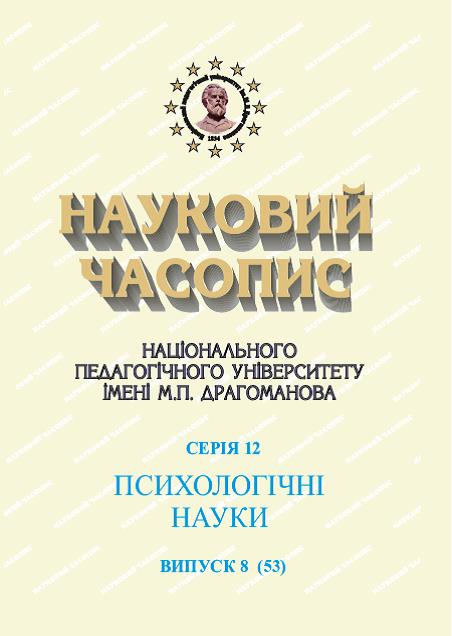PSYCHOLOGICAL PECULIARITIES OF STUDENTS’ BEHAVIOUR CONFLICTIVE FORMS WITH A DIFFERENT LEVEL OF EMOTIONAL INTELLIGENCE
DOI:
https://doi.org/10.31392/NPU-nc.series12.2019.8(53).05Keywords:
conflictive behaviour forms, emotional intelligence, interpersonal emotional intelligence, intra-personal emotional intelligenceAbstract
The article deals with the empirical study results of the interaction between conflictive behaviour forms and levels of students’ emotional intelligence development; the content of the «conflictive behaviour forms» notion and its classification, «emotional intelligence» and its structural components have been specified; the origin of conflictive behaviour forms according to the level of emotional intelligence of the personality based on gender and age characteristics are presented. The notion of conflictive behaviour forms, their classification and causes are analyzed. In particular, the complex of subjective and objective determinants of conflictive behaviour forms is stated. Conflictive behaviour forms are a style of human behaviour (physical, verbal, indirect aggression, irritation, negativity, offence, suspicion, etc.) that leads to conflicts. Practically any conflictive behaviour includes both subjective and objective causes of its origin. Therefore, its basis is a complex of determinants. Conflictive behaviour forms are divided into soft, neutral and tough and can be observed in each personality to a different extent. Students with a high level of emotional intelligence are inclined to a collaboration in conflict and a soft conflictive behaviour form (a position fixation, friendliness, an agreement, etc.); students with an average level of emotional intelligence development often resort to compromise in conflict and neutral conflictive behaviour forms (demonstrative actions, sanctioning, coalition); students with lower than average emotional intelligence keep to more tough conflictive behaviour forms (physical and psychological abuse, pressure, etc.) and are prone to competition in conflict situations. It is found that there is a close direct relationship between a particular group of conflictive behaviour forms and the appropriate level of students’ emotional intelligence development, namely: soft conflictive behaviour forms are most commonly used by students with a high level of emotional intelligence development; neutral conflictive behaviour forms are used by students with an average level of emotional intelligence development and tough conflictive behaviour forms are used by students with a low level of emotional intelligence.
References
- Andreieva, I. N. (2015). O stanovlenii poniatiia «Emotsyonalnyi intelekt» [The establishment of the notion «emotional intelligence»]. Voprosy Psihologiii – Psychology Issues, 5, 83-95. Retrieved from https://andreeva.by/o-stanovlenii-poniatiya.html [in Russian].
- Antsupov, A.Ya., & Shypilov, A.I. (2007). Konfliktologiia [Conflictology]. Sankt-Peterburg : Piter [in Russian].
- Grishyna, N.V. (2000). Psihologiia konflikta [Conflictive Psychology]. Sankt-Peterburg : Piter [in Russian].
- Zhuravlova, L.P., & Shpak, M.M. (2015). Empatiia yak psyholohichnyi mechanism rozvytku mizhosobystisnoho emotsiinoho intelektu [Empathy as a psychological mechanism of the development of interpersonal emotional intelligence]. Science and Education a New Dimension. Pedagogy and Psychology, 3(25), 85-88. Retrieved from http://eprints.zu.edu.ua/19316/1/ped_psy_25_49.pdf [in Ukrainian].
- Kotlova, L.O. (2014). Formuvania konfliktolohichnoii kompetentnosti studentiv yak chynyka yih osobystisnoho rozvytku [Students’ conflictology competence formation as a factor of their personality development]. Nauka i osvita – Science and education, 5, 162-168. Retrieved from http://eprints.zu.edu.ua/13662/1/Kotlova_2014.pdf [in Ukrainian].
- Kotlovyi, S.A. (2018). Formuvania sotsialnoho dosvidu bezkonfliktnoii povedinky [Social experience formation of nonconfrontational behaviour]. Suspilno-politychni ta psyholohichni studii – Social and political studios, 2, 64-68. Retrieved from http://eprints.zu.edu.ua/id/eprint/27826 [in Ukrainian].
- Liusin, D.V. (2004). Sovremenyie predstavleniia ob emotsyonalnom intelekte [Modern concepts about emotional intelligence]. InV. Lyusin, & D.V. Ushakov (Eds.), Sotsyalnyi intelekt. Teoriia, izmereniie, isledovaniia – Social intelligence. Theory, measurement, investigation. (pp. 29-36). Moscow : Izd-vo «Institut psihologiii RAN». Retrieved from http://www.creativity.ipras.ru/texts/books/social_IQ/lusin1_Social_IQ.pdf [in Russian].
- Petrovskaia, L.A. (1977). O poniatiinoi sheme sotsialno-psihologicheskogo analiza konflikta [About a notional scheme of social and psychological conflict analysis]. In Teoreticheskiie i metodologicheskiie problemy sotsyalnoi psihologiii – Theoretical and methodological problems of Social Psychology (pp.126-143). Moscow : Izd-vo Mosk. un-ta [in Russian].
- Shpak, M. M. (2014). Psyholohichni mehanismy rozvytku emotsiinoho intelektu [Psychological mechanisms of emotional intelligence development]. Nauka i osvita – Science and education, 5, 104-109. Retrieved from http://irbis-nbuv.gov.ua/cgibin/irbis_nbuv/cgiirbis_64.exeC21COM=2&I21DBN=UJRN&
P21DBN=UJRN&IMAGE_FILE_DOWNLOAD=1&Image_file_name=P
DF/NiO_2014_5_20.pdf [in Ukrainian]. - Matthews, G., Roberts, R., & Zeidner, M. (2004). Seven myths about emotional intelligence. Psychological Inquiry, 15, 179- DOI: 10.1207/s15327965pli1503_01

